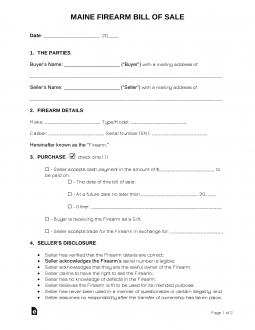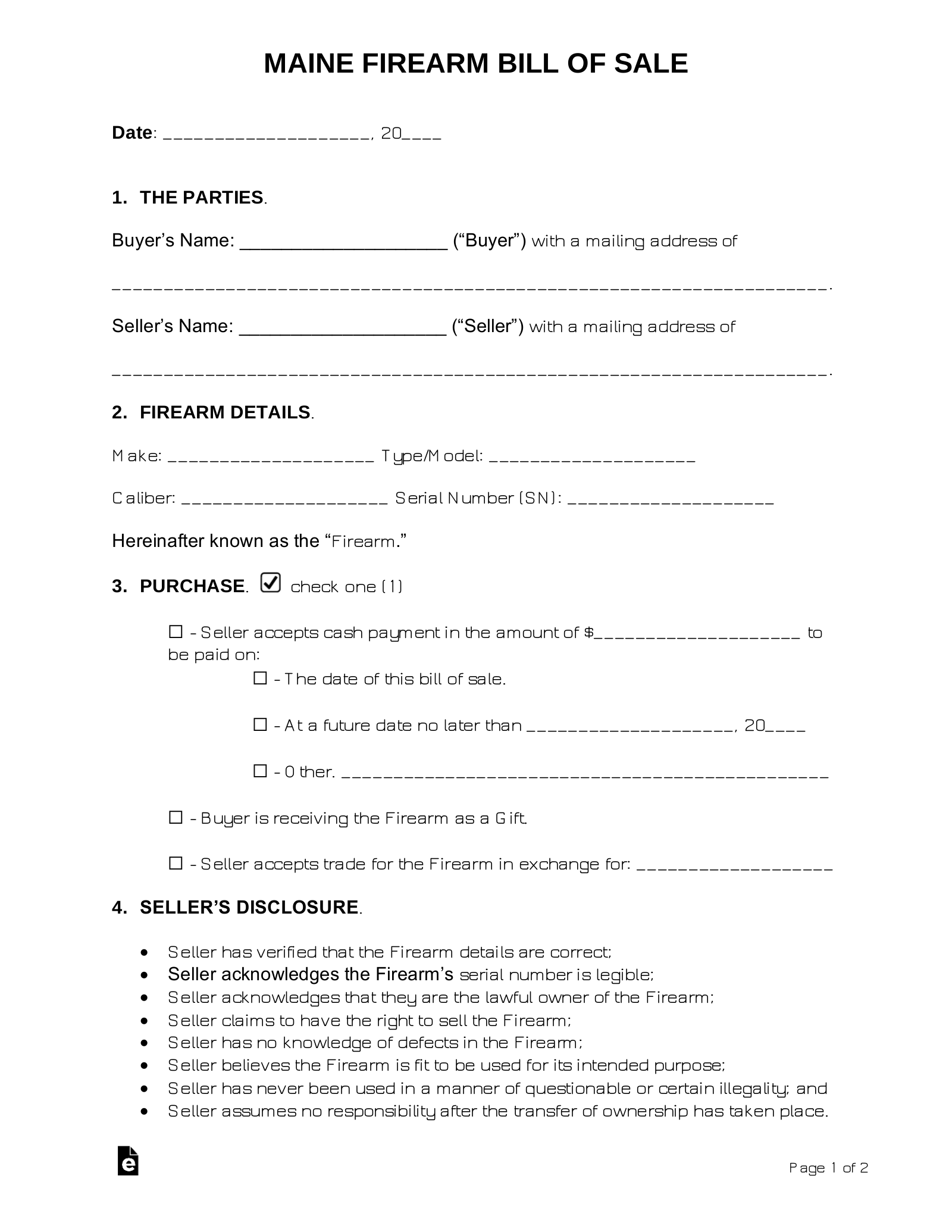Updated October 13, 2023
A Maine firearm bill of sale is a legal document that is used in the sale and purchase of a firearm between a dealer and an individual or between two (2) private parties. This document is proof of the change of ownership from the seller to the buyer and contains important information about both parties and the firearm itself. It is only recognized if all fields are completed and it is executed in the presence of a notary public.
Table of Contents |
Privately Selling a Firearm
Anyone who is permitted to own a firearm in Maine can sell a firearm in the state.
Prohibited from Buying
An individual is not permitted to own or purchase a firearm if that person:[1]
- Has been convicted of committing or found not criminally responsible by reason of insanity of committing:
- A crime in this State that is punishable by imprisonment for a term of one year or more;
- A crime under the laws of the United States that is punishable by imprisonment for a term exceeding one year;
- A crime under the laws of any other state that, in accordance with the laws of that jurisdiction, is punishable by a term of imprisonment exceeding one year. This subparagraph does not include a crime under the laws of another state that is classified by the laws of that state as a misdemeanor and is punishable by a term of imprisonment of 2 years or less;
- A crime under the laws of any other state that, in accordance with the laws of that jurisdiction,[2] but is elementally substantially similar to a crime in this State that is punishable by a term of imprisonment for one year or more; or
- A crime under the laws of the United States, this State or any other state or the Passamaquoddy Tribe or Penobscot Nation in a proceeding in which the prosecuting authority was required to plead and prove that the person committed the crime with the use of:
- A firearm against a person; or
- Any other dangerous weapon.
- Has been adjudicated in this State or under the laws of the United States or any other state to have engaged in conduct as a juvenile that, if committed by an adult, would have been a disqualifying conviction;[3]
- Is subject to an order of a court of the United States or a state, territory, commonwealth or tribe that restrains that person from harassing, stalking or threatening an intimate partner,[4] of that person or a child of the intimate partner of that person, or from engaging in other conduct that would place the intimate partner in reasonable fear of bodily injury to the intimate partner or the child, except that this paragraph applies only to a court order that was issued after a hearing for which that person received actual notice and at which that person had the opportunity to participate and that:
- Includes a finding that the person represents a credible threat to the physical safety of an intimate partner or a child; or
- By its terms, explicitly prohibits the use, attempted use or threatened use of physical force against an intimate partner or a child that would reasonably be expected to cause bodily injury.
- Has been:
- Committed involuntarily to a hospital pursuant to an order of the District Court[5] because the person was found to present a likelihood of serious harm,[6]
- Found not criminally responsible by reason of insanity with respect to a criminal charge; or
- Found not competent to stand trial with respect to a criminal charge.
- Is currently a restricted person[7] except that the prohibition applies to possession and control, and not ownership. Violation of this paragraph is a Class D crime;
- Has been ordered to participate in a progressive treatment program[8] and, as part of that order, directed not to possess a dangerous weapon[9] for the duration of the treatment program, except that the prohibition applies to possession and control, and not ownership. Violation of this paragraph is a Class D crime;
- Is a fugitive from justice. For the purposes of this paragraph, “fugitive from justice.”[10] has the same meaning as in. Violation of this paragraph is a Class D crime;
- Is an unlawful user of or is addicted to any controlled substance and as a result is prohibited from possession of a firearm, except those related to the use, possession, or transport of cannabis.[11] Violation of this paragraph is a Class D crime;
- Is an alien who is illegally or unlawfully in the United States or who was admitted under a nonimmigrant visa and who is prohibited from possession of a firearm.[12]
- Has been discharged from the United States Armed Forces under dishonorable conditions. Violation of this paragraph is a Class D crime;
- Has, having been a citizen of the United States, renounced that person’s citizenship. Violation of this paragraph is a Class D crime.
Registering a Firearm
No government agency is permitted to require residents of Maine to register their firearms or themselves as firearm owners.[13]
Concealed Carry
Anyone who is twenty-one (21) years old or older and is eligible to own a firearm can carry a concealed weapon without a permit. Any person between eighteen (18) and twenty (20) years of age must obtain a permit to concealed carry.
How to Apply
A person must be at least eighteen (18) years of age or older to obtain a permit to carry a concealed handgun.
Step 1 – Find out if the State Police issues permits in the applicant’s city of residence, or if the city issues permits directly.[14]
Step 2 – Complete a Resident Concealed Handguns Permit Application.
Step 3 – Attach proof of completing a federally recognized handgun safety course.
Step 4 – Attach a passport-quality photo of the applicant.
Step 5 – Attach a copy of the applicant’s birth certificate.
Step 6 – Submit the application to the local city authority or the Maine State Police Special Investigations Department (164 State House Station, Augusta, Maine 04333-0164).
Step 3 – Pay the appropriate application fee.[15]
Reciprocity
The law explains that Maine recognizes the concealed carry permits of all states that in turn recognize Maine’s permit. Permits from the following states are not recognized in Maine: Arkansas, California, Colorado, Connecticut, Hawaii, Illinois, Indiana, Maine, Maryland, Massachusetts, Minnesota, Montana, Nevada, New Jersey, New Mexico, New York, Oregon, Pennsylvania, Rhode Island, South Carolina, South Dakota, Tennessee, Texas, Vermont, Washington, West Virginia, and Wisconsin.[16]
Sources
- 15 ME Rev Stat § 393
- 15 ME Rev Stat § 393(A-1)(3)
- 15 ME Rev Stat § 393(A-1)
- 18 U.S. Code § 921(a)
- Me. Stat. tit. 34-B § 3864
- Me. Stat. tit. 34-B § 3801(4A)
- Me. Stat. tit. 34‑B § 3862‑A(1)(K)
- Me. Stat. tit. 34-B § 3873‑A
- Me. Stat. tit. 34-B § 3873‑A(7-A)
- Me. Stat. tit. 15 § 201(4)
- 18 U.S. Code § 922(g)(3)
- 18 U.S. Code § 922(g)(5)
- 25 ME Rev Stat § 2014
- Permit Data: Municipalities – State Police
- Application Fee
- 25 ME Rev Stat § 2001-A(2)(F)


